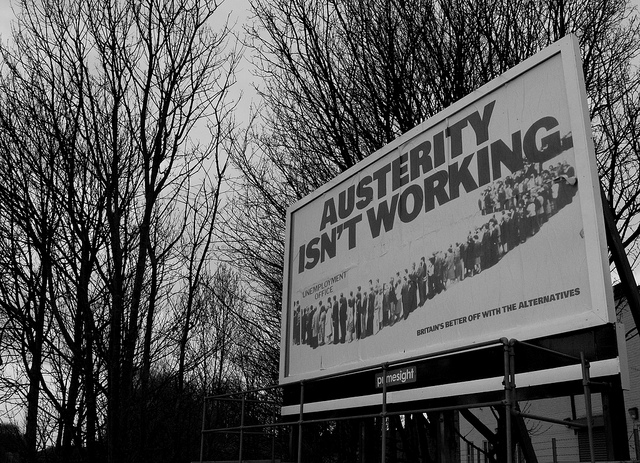 Austerity not only disproportionately impacts the disadvantaged, it also doesn’t work. First and foremost, we need to end austerity, resume borrowing and boost spending to stimulate growth and jobs. Then we should focus on the long-term requirement of rebuilding and regenerating a strong economy, writes Austin Mitchell MP.
Austerity not only disproportionately impacts the disadvantaged, it also doesn’t work. First and foremost, we need to end austerity, resume borrowing and boost spending to stimulate growth and jobs. Then we should focus on the long-term requirement of rebuilding and regenerating a strong economy, writes Austin Mitchell MP.
Ours is an age of austerity. Always imposed d’en haut en bas, austerity is being used to punish the people for the crimes of the rich. The banking crashes of 2008 and the resulting recession were caused by the greedy, over-leveraged speculations of the banks. The response of government was to roll back the state and punish the people, a process described as ‘expansionary fiscal contraction’—an oxymoron more moronic than oxy because the private sector, which was supposed to expand as the public sector contracted, was itself crippled by debt and recession. It couldn’t, and didn’t, expand enough.
Austerity is a class issue, hitting the disadvantaged and the regions which depend most on the state hardest. It weakens labour and the unions while protecting wealth and powerful corporations which are well cushioned. It is divisive. In Britain government justifies it as protecting ‘strivers’ against scroungers who lie abed procreating. Everywhere it stirs extremism, with UKIP, the BNP, fascist parties and extreme left groups in Europe all growing. One further characteristic is more salient— it doesn’t work. Cutting spending rather than boosting it, as governments should in a recession, puts people out of work, reduces demand and bankrupts companies.

Britain, though now seeing glimmerings of growth after a damaging three-year deflation, faces another two years of minimal growth which may not take GDP back to 2008 levels by the next election, with all the growth that normal trends would have produced since lost.
What should Labour do?
The backlash against failed policies, broken hopes and the damage of five years’ hard austerity will leave the economy, blighted by years of underinvestment, neglect and austerity, no longer able to generate the jobs, the tax revenues and the growth an advanced nation requires. It can’t even pay the nation’s way in the world.
Tough problems demand strong policies, but Labour has been disinclined to develop any and still clings to the respectable garb it donned for the 2010 election: proposing to cut the debt more slowly. It offers no increase in borrowing, no promise to restore Tory cuts or to end the wage freeze. None of this provides the hope electors need or any prospect of regenerating Britain‘s failing economy. Nor does it offer any clear, confident alternative to prolonged austerity and failure.
The long-term requirement is to rebuild and regenerate a strong economy, but the immediate problem in 2015 will be to end austerity, resume borrowing and boost spending to stimulate growth and jobs. Growth is the only way to pay off debts and revive government revenues, so boosting it must begin early. Labour has been too frightened of borrowing and too quick to crumble when faced with the simplistic Tory piggybanking litany against it. Public borrowing is very different to private debt. Private borrowing is a burden. Public borrowing and spending have a stimulating multiplier effect which is essential to build the future. Interest rates are very low and Britain’s credit good enough to borrow large sums long term—far cheaper and more effective than borrowing by a cautious private sector from banks which are reluctant to lend. Borrowing isn’t a folly. Not borrowing is.
The real problem is how to spend the money to best effect. Simon Jenkins advocates ‘helicopter money’, showering it on the poor who spend. That might be desirable if the helicopter hovered over Grimsby, but in practice the best way to spend is a massive building programme of public housing for rent, either council or social housing, to provide for the two fifths of the population who can’t afford to buy. The Coalition’s desperate programme of building only houses for sale and subsidising their purchase won’t close the gap between build and need of 140,000 houses a year, but it will set (and is setting) the disastrous (but electorally attractive) house price spiral in motion again. On the other hand, a huge programme of public housing for rent brings house prices down and cuts spending on housing benefit, which is high only because we’ve not built. Just as it did in the 1930s, house building will create jobs, boost the construction industry and create demand for furniture and the lars et penates of living.
Keynesian expansion will provide short-term regeneration. Rebuilding Britain’s shrunken industrial base requires the use of techniques of economic nation-building which competitors, starting with Germany, used to build up their powerful exporting sectors and the national champions we have lost. The key is exchange rate competitiveness.
Rivals all started with a low exchange rate and kept it low to boost exports. We started with an overvalued rate always kept too high because the City wanted it that way. As a result imports rose and Britain lost markets, even its home market. A much lower exchange rate is essential to put the British economy on a competitive basis.
Britain needs a National Investment Bank.
Most countries have one. It can be funded partly by government, partly by money raised on the market and partly by the quantitative easing money pumped out by the Bank of England. A British Investment Bank can not only finance major contracts in housing and construction but provide the investment for expansion and new factories, as well as the start-up money for small and medium enterprises to grow. The banks aren’t doing their job. The best way to push them to it is not to pour money into them but to provide a powerful competitor.
Both political parties have forsworn industrial policy, discredited by the failure to pick winners. Now with so few competitors in any export field and no national champions of the type which power competitors, picking winners means coaching companies back into the game and helping them to play it. That requires investment support; help with planning and transport problems; support for research, development, design and training, all of which have been seriously cut; and help in the export markets, where it is important to seize the competitive edge given by devaluation quickly if growth is to become export-led rather than home market-dominated.
A basic part of the policy needs to be corporate governance reform to stop companies being traded like toys, give workers power in the companies, as in Germany, and push companies to investment and growth rather than the obsession with shareholder value. Long-termism is a strength. It can be nurtured by heavy taxation of short-term speculative share dealings and rewards for long-term tenure.
Some of this programme will face problems with EU rules unless we change our relationship. Labour MPs are uncritically pro-EU but should recognise that Labour, too, needs changes if it is to rebuild the productive base. The Tory referendum plan for 2017 is a confidence trick just as surely as Harold Wilson’s 1974 ‘Renegotiate then Referendum’ was, and will have much the same effect. Any Tory renegotiation will be for very different changes to the ones we need to rebuild the economy. The state aid rules, a threat largely ignored by other nations, would be a threat to Labour’s industrial policy. We need more control over immigration so as to concentrate on importing skills and investment and to bring all other immigration down when unemployment is high, but relax when the economy demands labour. We should also catch and process more of our own fish and aim at lower food prices through the power to buy in the cheapest market. Finally our contributions, totalling over £20 billion a year (£10 billion of them to the budget), are too high for a nation in balance-of-payments difficulties. It is surely sensible to gear contributions on the nation’s trade deficit/surplus. That’s the measure of its ability to pay. Ours is low.
Renegotiating all that will take time and create uncertainty. Better, therefore, to repeal EU powers to strike our measures down, then negotiate from strength. An enormous machinery of fear creation will be trundled into action against us but our exports to Europe will be in no danger whatever our status. The EU will want us to stay but that must be on our terms, not as a reluctant, suffering reprobate. Britain needs a degree of distance and an ability to act for ourselves to rebuild a powerful economy.
Such are the outlines of an economic policy which departs form the norms of the past three decades, when governments have talked of ‘tough measures’ while pursuing the people-pleasing policies of rising house prices, cheap imports and fighting inflation, all of which were damaging to an industrial base in decline. Now Labour must focus on that decline, knowing that unless the productive economy is repowered, and Labour government, indeed any British government at all, fails.
A longer version of this article appears in the most recent issue of Political Quarterly.
Note: This article gives the views of the author, and not the position of the British Politics and Policy blog, nor of the London School of Economics. Please read our comments policy before posting.
About the Author
 Austin Mitchell is a Labour Party politician who has been the Member of Parliament for Great Grimsby since a 1977 by-election.
Austin Mitchell is a Labour Party politician who has been the Member of Parliament for Great Grimsby since a 1977 by-election.








So, let’s talk about Upwards Social Mobility, and let’s Change attitudes – policies and practices in order to get the most out of people – instead of the suppression we already get from Work Programme… and the failure to engage proactive job seekers with ambitious employers.
The progressive nature of The Aspiration Nation seems to have fallen from grace. But, why? Is it not correct that in times of challenges that we become more broader in thought and innovative in policy? Isn’t this the reason why many newspaper headings will use the term ‘ unemployment’ and not talk about the ambition of proactive job seekers?
What is unfortunate – even a failure by the Party Leadership – is that ‘Leadership’ did not dictate how Bold it needs to be to engage with ‘ordinary’ hard working people who amid the depressed economic downturn.. still desperately want to maintain hope… and reach goals in employment. Listening, engaging and Empowering is the tool used to develop the £15mn Co-collaborative Community – introduced by this coalition government. However, this alone will never reach the people that I am eager to support – the ambitious and determined goal-seekers who want to ‘get there against all odds’.. and don’t want to be failed again.